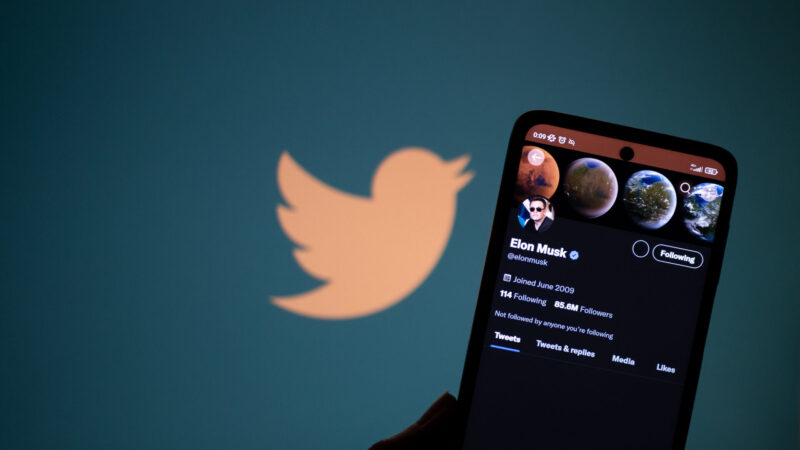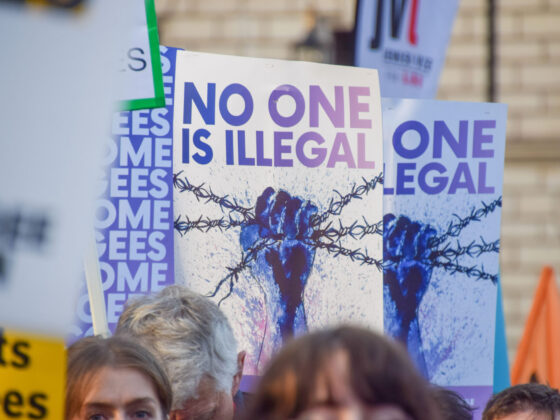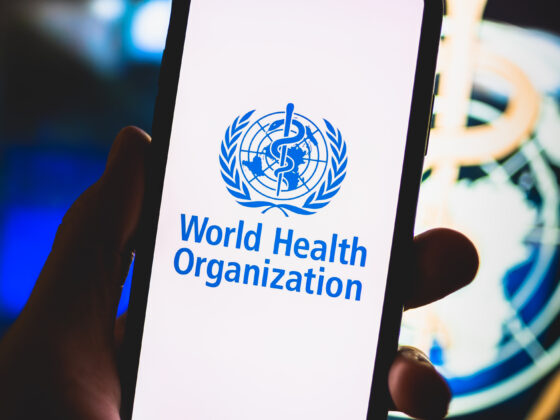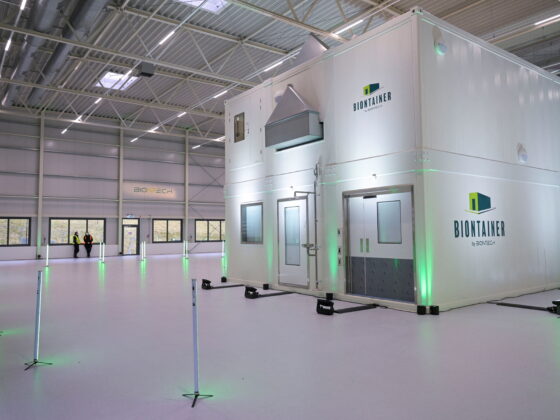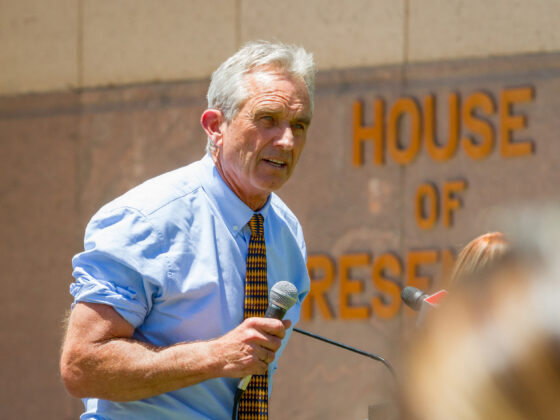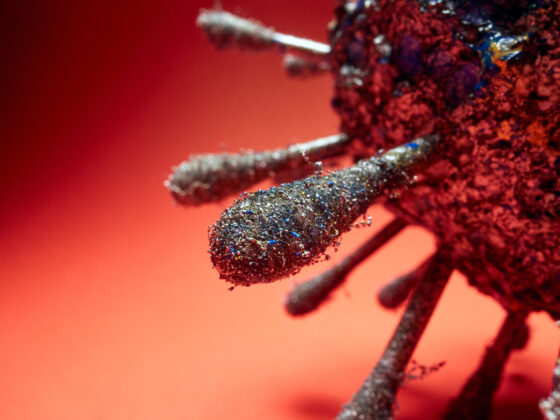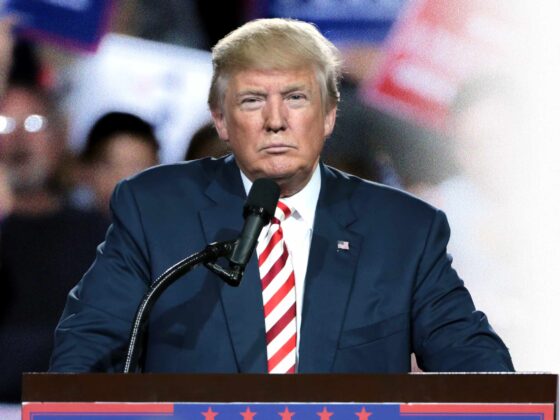How Elon Musk’s Twitter acquisition quashed the chilling news of the FDA’s approval of remdesivir for young children.
On April 25, 2022, there were two big items in the news. One was that Elon Musk “bought” Twitter. This was really big news. It was everywhere.
The other was that the U.S. Food and Drug Administration (FDA) expanded approval of the first and only COVID-19 treatment to include very young children.
What might that treatment be?
No, it isn’t fresh air, exercise and healthy eating habits.
It’s remdesivir, packaged under the name Veklury.
The news of Veklury’s approval is so much more important than Musk’s acquisition of Twitter, but according to the media you would never know it. That’s because sensationalism sells where unconscionable truths do not.
Who makes Veklury?
A company called Gilead Sciences, is a “biopharmaceutical company that discovers, develops and commercializes innovative therapeutics in areas of unmet medical need. The company’s mission is to advance the care of patients suffering from life-threatening diseases. Gilead has operations in more than 30 countries worldwide, with headquarters in Foster City, California.”
Let’s take a look at the top investors in Gilead as of December 30, 2021:
Blackrock Inc. shares: 9.49%
Capital Research Global Investors: 8.55%
Vanguard Group, Inc.: 8.44%
State Street Corporation: 4.58%
Well, isn’t it funny how those same companies keep popping up as top investors in every type of industry?
LET’S TAKE A LOOK AT SOME FACTS ABOUT REMDESIVIR:
Study after study has shown that remdesivir causes kidney failure. The National Library of Medicine noted that:
Remdesivir is a novel adenosine-like nucleotide analogue… with an uncertain clinical relevance. In clinical trials and case series, acute kidney injury (AKI), including renal replacement, has been frequently reported.
Kidney International noted:
Compared with the use of chloroquine, hydroxychloroquine…the use of remdesivir was associated with an increased reporting of kidney disorders.
On July 16, 2021, it a large remdesivir study found that:
A lack of consensus regarding the antiviral drug remdesivir to treat people with COVID-19 leaves doctors without clear direction on one of the few treatments for the illness the FDA has granted emergency use authorization.
The latest research comes from Michael Ohl, MD, and colleagues who studied a large group of Veterans Administration patients hospitalized with COVID-19. Compared with a matched group of veterans who did not receive the antiviral, remdesivir did not significantly improve survival rates
It was back in October of 2020 that Science.org came out with this headline:
“The ‘very, very bad look’ of remdesivir, the first FDA-approved COVID-19 drug, stating ‘The Food and Drug Administration held no advisory meeting on antiviral, and the European Union signed a contract without knowing of a failed trial.’
At best, one large, well-designed study found remdesivir modestly reduced the time to recover from COVID-19 in hospitalized patients with severe illness. A few smaller studies found no impact of treatment on the disease whatsoever. Then, on 15 October… the fourth and largest controlled study delivered what some believed was a coup de grâce: The World Health Organization’s (WHO’s) Solidarity trial showed that remdesivir does not reduce mortality or the time COVID-19 patients take to recover.
That deal that the FDA signed with Europe was worth a cool $1 billion. Two weeks after the deal was inked, on October 22, 2020, the FDA approved remdesivir, the first drug to receive that status.
The decision to go with remdesivir baffled scientists since studies had shown no worth for the drug in combatting COVID.
Nine members of the FDA Panel tasked with determining acceptable COVID-19 treatments disclosed financial ties to Gilead. At least 7 other members failed to disclose their financial ties to Gilead while a number of other panel members appeared to have links to Gilead that required no disclosure.
Together, Gilead-linked individuals made up a majority of the panel that decided to approve remdesivir.
It also should be noted that the price tag for remdesivir is $5000, or $3,120 with private insurance, versus approximately $37 for say, Hydroxychloroquine, or even less for Ivermectin. It should therefore be no surprise which drug the corrupt FDA chose to approve while discrediting the others.
Remdesivir isn’t a pill. It isn’t easy to take. It has to be injected and monitored in a clinical setting.
As for side effects, the NIH website says that Remdesivir can cause gastrointestinal symptoms (e.g., nausea), elevated transaminase levels (causing inflammation of the liver), an increase in prothrombin time without a change in the international normalized ratio, and hypersensitivity reactions.
In plain English, over and over we see this warning: liver failure. Study after study sounded alarms as noted in Forbes article The Strange Story of Remdesivir, the Drug that doesn’t work.
A September 2021 Lifesite article said, “the high mortality rate and frequency of adverse effects associated with Remdesivir ‘begs the question … Why is this the protocol in American hospitals?’“
A lot happened in October of 2020 leading up to remdesivir’s approval by the FDA. For those of you who don’t remember, the best sales pitch for remdesivir came at the beginning of that month when President Donald Trump announced he had contracted COVID-19 and was admitted to Walter Reed National Military Medical Center in Bethesda, Maryland.
On October 3rd, 2020, it was announced that Trump was receiving an experimental antiviral for Covid-19 called remdesivir as “part of a double-barreled treatment plan that includes an antibody cocktail meant to give the president’s immune system a boost to fight off the coronavirus.”
We all held our breath as Trump fought off the virus and made a miraculous recovery. I, for one, will never forget that inspiring moment when he returned from hospital, stood on the balcony of the White House and defiantly tore off his mask.

Looking back at these events, one can only gasp at the level of thought and preparation that went into the production of this plot of plague and salvation. When we make the effort to follow an individual trail, such as this one on remdesivir, separating it from the chaos of the entire picture, we see how meticulously each episode has been mapped out, detail by detail.
To now find out, after all the lies and cover-ups, that this failed drug with its exorbitant price tag is the only approved treatment for children is beyond horrific. I don’t think there is any event to date that illustrates more conclusively the continued escalation of the evil being perpetrated upon us all, and in particular, our children.
Yet, despite every proof disqualifying it, on April 25, 2022, the FDA expanded the use of Veklury, or remdesivir, to include pediatric patients who are 28 days and older, weigh at least 7 pounds, and have tested positive for COVID-19. The FDA approval is applicable to children who are hospitalized or have mild-to-moderate COVID-19 symptoms and are also at high risk of severe COVID-19.
Let’s get back to Elon Musk and Twitter. On the day Musk bought Twitter, did he tweet about the horror of this announcement?
No, he did not.
You might counter, come on, give the guy a break. How could this have been of any interest to him on such an auspicious day?
I say, how could it have not?
Forever shame on him and the billions of others who fixated on the news of Musk’s latest drama rather than the poison being approved to administer to our children.
Has Musk ever said anything against the vaccine, for example?
He certainly has not.
In December 2021, Musk was named the TIME Person of the Year. At that moment it should have become clear to us all that Musk had become a major actor in this plague drama and his Time award didn’t happen in a vacuum. In his interview, Musk said that he had been vaccinated against COVID-19, and that, “the science is unequivocal.” Musk also indicated that all of his eligible children were vaccinated. He then went on to claim he had tested positive for COVID twice. At no time did he ever question the efficacy of the vaccines.
Let me be clear. No one who promotes this vaccine in any way, shape or form is to be trusted. There is too much at stake. We should no longer tolerate the half-hearted commitment from our conservative leaders, saying they encourage vaccination but do not support mandates. This is not enough! Not after this latest blatant ruling by the FDA of intentional poisoning of our children.
The more we give in, inch by inch, justifying to ourselves that we are “getting our freedoms back”, the more our slavedrivers sink their claws into our bodies and our minds—all the while building whatever their psychotic vision of their personal utopias might be, whether it’s to populate Mars as Musk raves on about, or to achieve immortality as he makes fun of Bezos for trying to do.
Mind you, Musk and Bezos aren’t the only ones; they are just those with the highest profiles. Several other billionaires, including Alphabet’s Larry Page, Oracle’s Larry Ellison and Palantir’s Peter Thiel, are investing in the quest to live forever—a topic for another day.
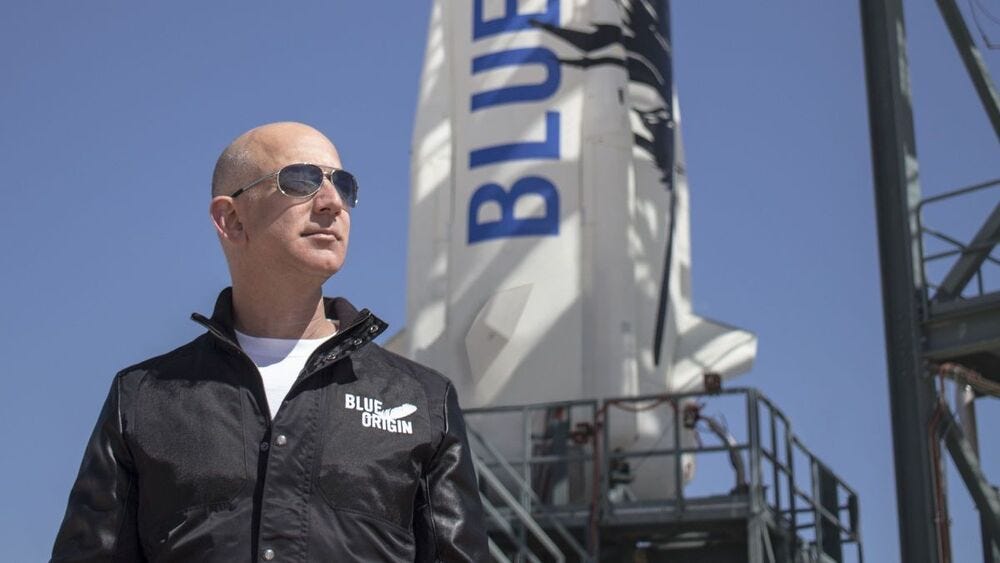
Musk and Bezos have an entertaining rivalry in their race to space and their jockeying for position as the world’s richest man. Their rivalry continues with Bezos tweeting on the 26th regarding Musk’s Twitter acquisition:
“Interesting question. Did the Chinese government just gain a bit of leverage over the town square?”
Which was in response to Mike Forsythe’s tweet:
“Apropos of something:
-Tesla’s second-biggest market in 2021 was China (after the US)
-Chinese battery makers are major suppliers for Tesla’s EVs.
-After 2009, when China banned Twitter, the government there had almost no leverage over the platform -That may have just changed”
If we don’t know the answer to that “interesting question” by now, we really haven’t been paying attention.
A more pressing question should be: why this particular drug, remdesivir?
The answer is chilling. Follow along with me as I tell the little story of how it happened.
Gilead pharmaceuticals had a long history with remdesivir. It had been researching the drug for use against coronaviruses and Ebola since 2009. And although Gilead didn’t have much luck with it, Gilead nevertheless filed a patent for remdesivir back in 2016 for methods to treat coronavirus infections.
So, there was remdesivir, just waiting for the perfect opportunity to come along, in the form of COVID-19.
We’ve heard this story of taking an old drug and repositioning it time and time again. Dr. Fauci did the same thing with AZT, which I discuss in my essay The Victimization of Dr. Fauci and the Resurrection of HIV:
[Dr. Fauci, in collaboration with] Burroughs Wellcome took an old cancer drug that hadn’t worked out very well, AZT, or azidothymidine, and repurposed it for AIDS. In 1987, Wellcome obtained FDA approval to market the drug, after a rushed and bogus trial. But no matter, this was an emergency, and something was better than nothing. The company called the “new” drug Retrovir and sold it for $188 for a hundred 100mg capsules. The price was so high most people could not afford it.A hundred times worse than Wellcome’s price-gouging were the side effects of AZT, including severe intestinal problems, damage to the immune system, nausea, vomiting and headaches. People taking AZT soon began showing rising virus levels — but the virus was no longer the same, having mutated to resist the drug. More drugs were needed.
In February of 2020, Gilead’s remdesivir entered trials for coronavirus treatment. Where? Not in the United States, but in China—a favorite place that our researchers and scientists like to go when they need to come up with positive results for questionable products, in order to please the powerful pharmaceutical companies that have hired them.
You see, it bears repeating that despite the world fracturing around us, the elite still march forward, creating a one world power. They do not care about borders—they leave such old-fashioned concepts to the rest of us. They will go anywhere and work with anyone, if it means reaching their goals. Morals and ethics are not a consideration.
Gilead confirms this in its statement it was: “working closely with global health authorities to respond to the novel coronavirus (2019-nCoV) outbreak through the appropriate experimental use of our investigational compound remdesivir. While there are no antiviral data for remdesivir that show activity against COVID-19 at this time, available data in other coronaviruses give us hope.”
There is some dispute about the agreement China and Gilead Sciences reached on the patenting of remdesivir. However, there is no dispute that the state-run Wuhan Institute of Virology says it filed a patient for remdesivir on January 21. It should also be noted that Gilead’s drug patent sharing subsidiary branch called UNITAID conveniently has an office near Wuhan. For the record, donors and partners include the Bill & Melinda Gates Foundation and the Clinton Foundation.
And if you want to dig even deeper, you can go back to Charles Ortel, the noted Wall Street financial analyst who “charged the Clintons with running the Clinton Foundation as a vast international criminal conspiracy, involving administration of UNITAID funds.”
Ortel argued:
…the story of the Clinton Health Access Initiative (CHAI)/UNITAID scam is one of the most poignant alleged Clinton Foundation abuses demonstrating how the Clintons used their tax-exempt foundation to conduct a “reverse Robin Hood,” robbing the average air traveler in France to benefit the rich, namely themselves, at the expense of short-changing those inflicted by HIV/AIDS from treatment that the World Health Organization had promised the international community represented would be delivered honestly.
Added to all of the above, we now know Fauci authorized funds to be sent to The Wuhan Institute of Virology specifically for the “study” of Coronaviruses, and it becomes a dizzyingly incestuous array of greed and deceit dating back many, many years.
We should all be revolted by this. We now all know the answer to the question, why this particular drug remdesivir?
It is most certainly a chilling one.
It isn’t to cure anyone of anything, certainly not our children. That would defeat the purpose of developing these useless—and dangerous—drugs in the first place.
Like AZT, remdesivir was sitting there, ready and waiting to be exploited when needed.
It was of no importance that remdesivir didn’t work on adults. They found a way to lie and cheat, like they always do.
And then, they were so greedy that they couldn’t stop with adults. They had to inflict it upon small children.

The only preventive measures that make sense for children against a virus are to eat healthy, exercise and play outdoors. But such logical measures can never be the treatment. Why? Because such measures would make the children healthy and strong, not more dependent on the drug pushers whose sole desire is to grow richer and more powerful.
I’m sorry, I have nothing but contempt for Elon Musk and all the others. Not a single billionaire made a squeak of protest about remdesivir’s shocking approval for children.
In fact, throughout this pandemic, I don’t recall a single billionaire ever suggesting children should live healthy lives rather than take the latest drug.
Another pound of flesh off of us and our children that they will own, in their psychotic quest to “rule the world.”
Do not allow yourself to become giddy and starry-eyed by these earthly gods. Resist and reject them. They are not your friends.
But your children are everything.


